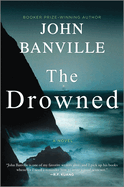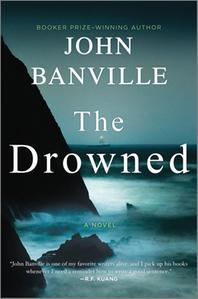
 John Banville's The Drowned transports readers to a dour small town on the 1950s Irish coast, where one tragedy after another makes a small cast of characters reconsider what they know and value in the world they inhabit. In his established style, Banville (The Singularities; Snow; Ancient Light; Holy Orders writing as Benjamin Black) offers a stark series of events in understated tones and with a handful of voices. These include Dublin Detective Inspector Strafford and the brilliant pathologist Quirke.
John Banville's The Drowned transports readers to a dour small town on the 1950s Irish coast, where one tragedy after another makes a small cast of characters reconsider what they know and value in the world they inhabit. In his established style, Banville (The Singularities; Snow; Ancient Light; Holy Orders writing as Benjamin Black) offers a stark series of events in understated tones and with a handful of voices. These include Dublin Detective Inspector Strafford and the brilliant pathologist Quirke.
"He had lived alone for so long, so far away from the world and its endless swarms of people, that when he saw the strange thing standing at a slight list in the middle of the field below the house, for a second he didn't know what it was." It turns out to be a luxury motorcar, abandoned, engine still running. The loner who discovers it actively avoids human contact: "Yes, life, so-called, was a birthday party gone wild, with shouting and squabbling, and games he didn't know the rules of, and one lot ganging up on the other, and knocking each other down and dancing in a ring like savages, the whole mad rampage going on in a haze of dust and noise and horrible, hot stinks." He approaches, against his better judgment, and winds up involved in a missing-person case, which will draw Strafford to town, even as the detective wrestles with his own relationships: an estranged wife, a much younger girlfriend, and ever-complicating ties to Dr. Quirke. "We have one thing in common, at least," Quirke quips to Strafford. "Death." Death is an obvious theme, not only in the two characters' professional lives but throughout Banville's troubled setting.
Enriched by Banford's attention to detail, the narrative grows more compelling in its telling by these and other characters, each suffering more or less alone even when they are married, partnered, or set next to immediate family. "The least of remembered things are the most affecting. That walk, the birdlike turn of her head, those trim ankles." The Drowned is slow building, sedately paced, and grim, but wickedly absorbing. By the mystery's denouement, some readers will have guessed the perpetrator's identity, but it is less that identity and more the psychology of it that is Banville's final blow. Through these intricacies and its murky sense of foreboding, this inexorable novel will continue to advance Banville's considerable reputation. --Julia Kastner, librarian and blogger at pagesofjulia
Shelf Talker: A recluse discovers an abandoned car and winds up involved in a missing-person case with Strafford and Quirke, who are back at work in this novel of secrets and quiet desperation.

